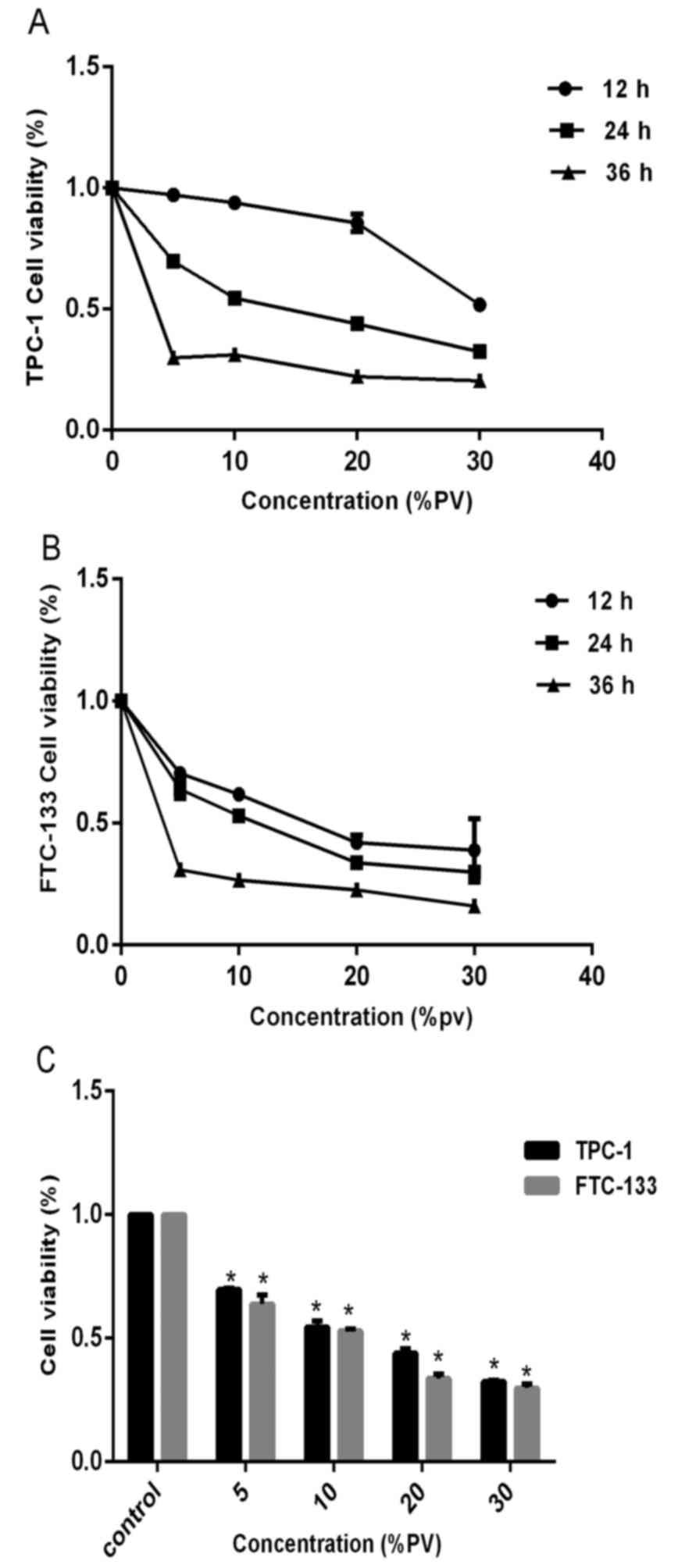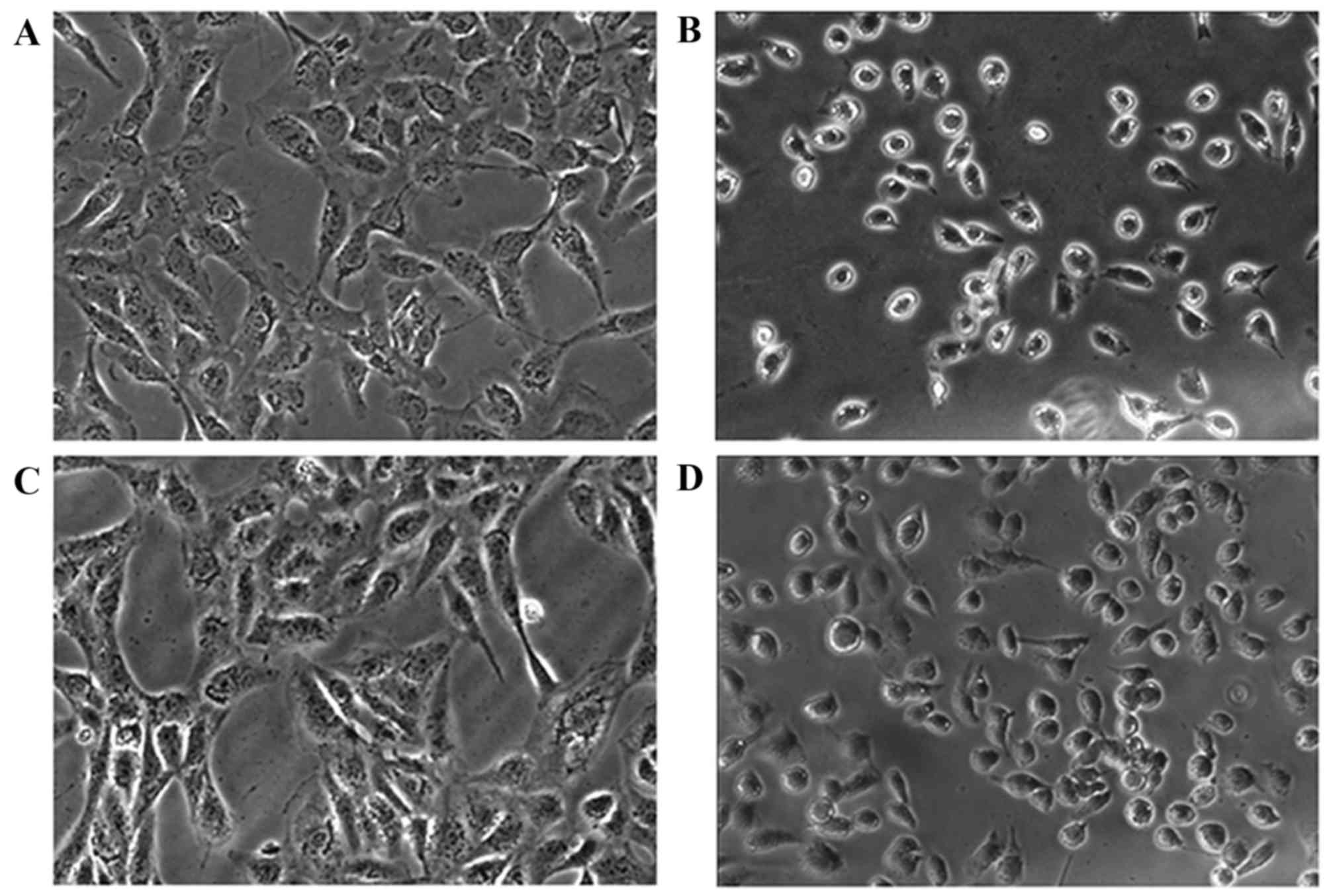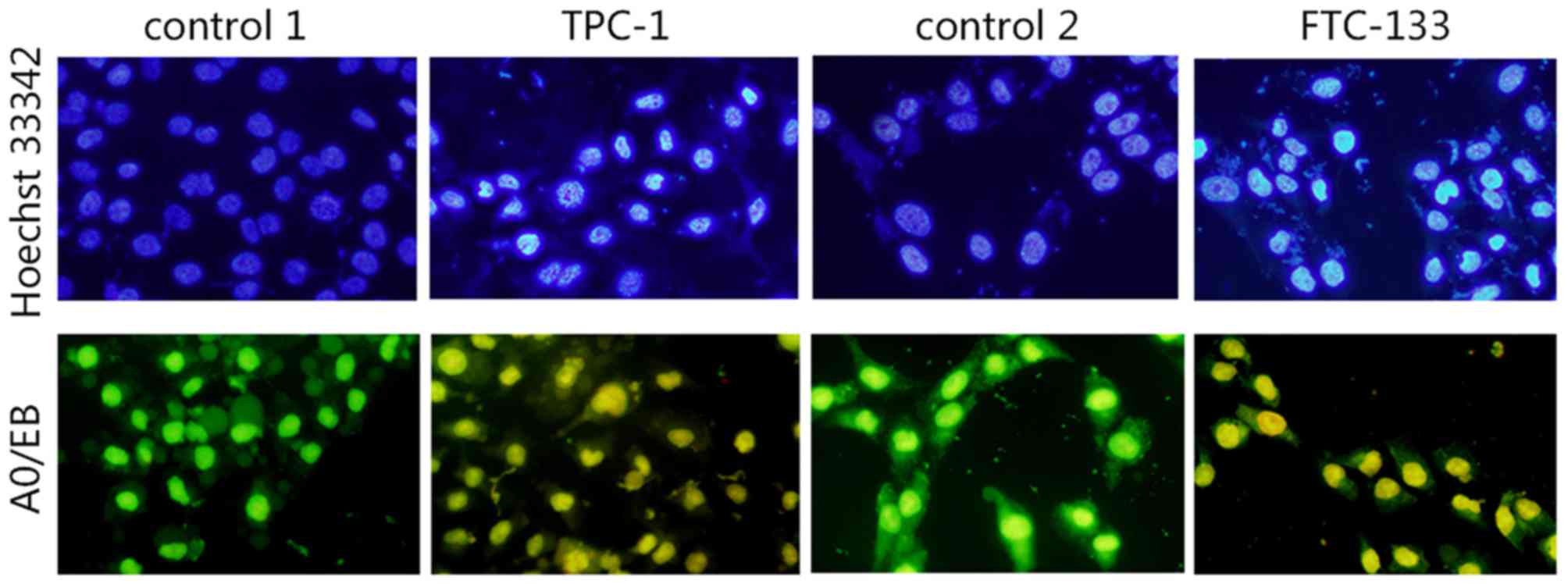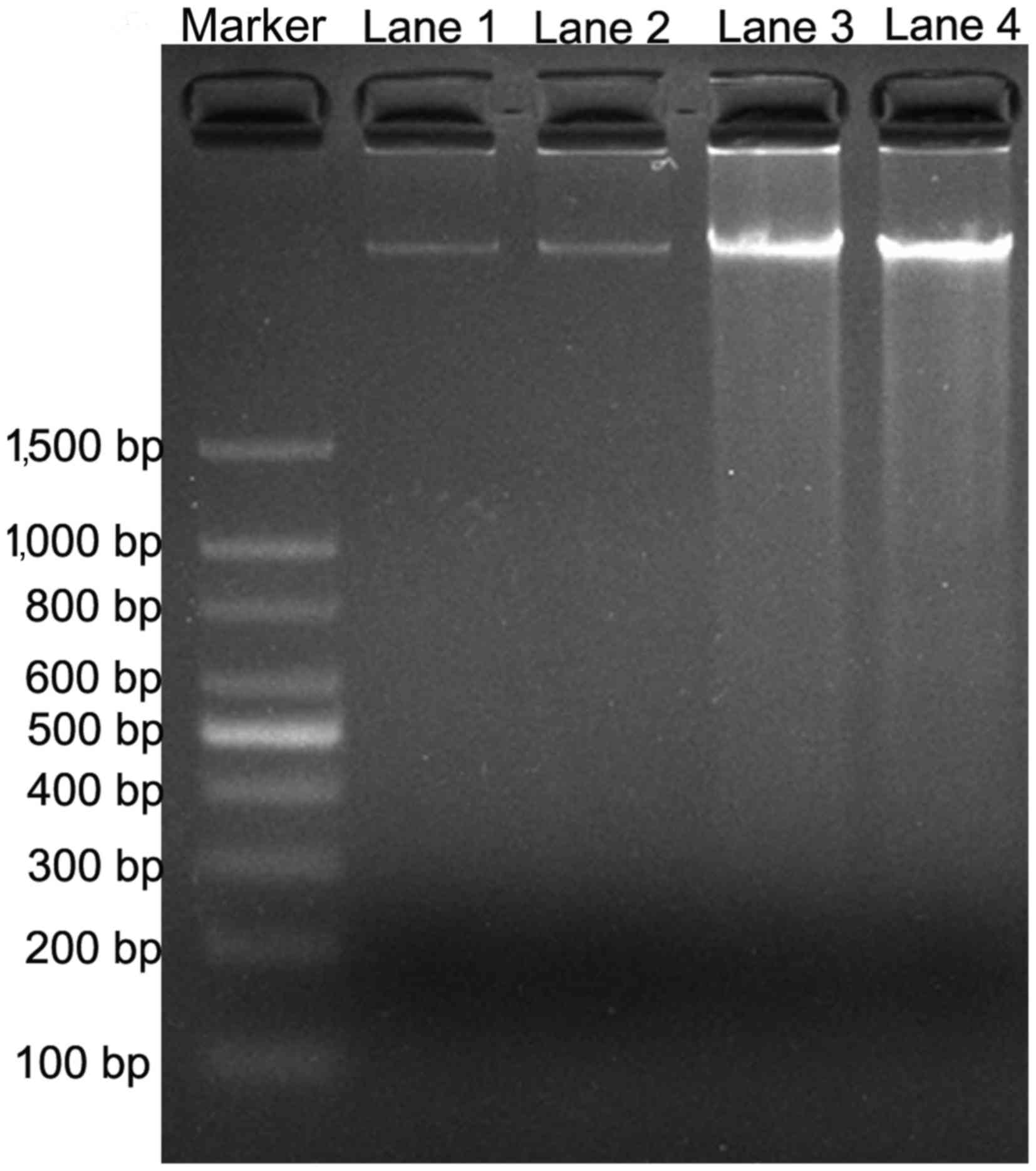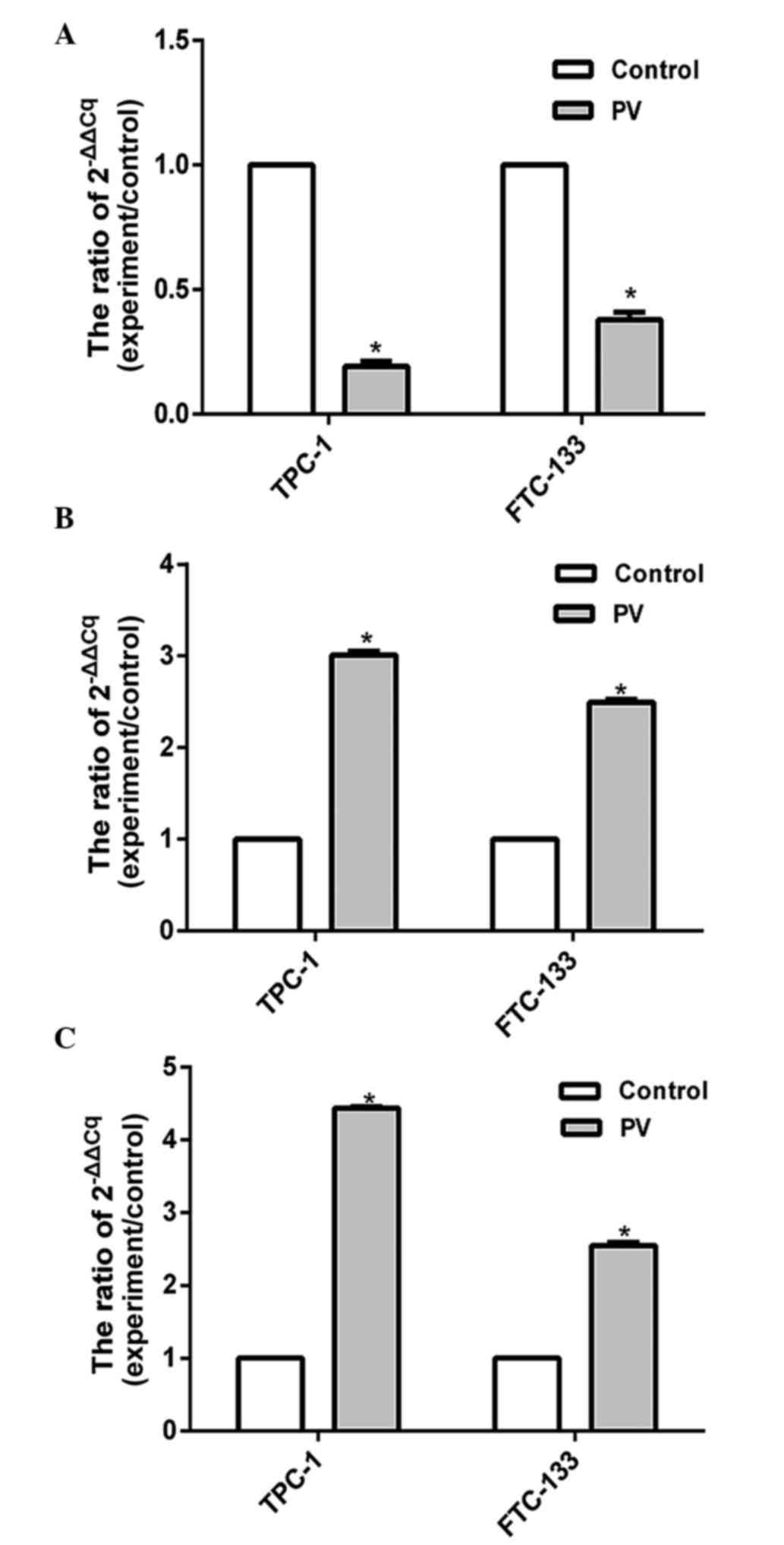|
1
|
Yin D, Wu W, Li M, Wang QE, Li H, Wang Y,
Tang Y and Xing M: DKK3 is a potential tumor suppressor gene in
papillary thyroid carcinoma. Endocr Relat Cancer. 20:507–514. 2013.
View Article : Google Scholar : PubMed/NCBI
|
|
2
|
Pacini F, Castagna MG, Brilli L and
Pentheroudakis G; ESMO Guidelines Working Group, : Thyroid cancer:
ESMO clinical practice guidelines for diagnosis, treatment and
follow-up. Ann Oncol. 23 Suppl 7:vii110–vii119. 2012. View Article : Google Scholar : PubMed/NCBI
|
|
3
|
Soares P, Lima J, Preto A, Castro P,
Vinagre J, Celestino R, Couto JP, Prazeres H, Eloy C, Máximo V and
Sobrinho-Simões M: Genetic alterations in poorly differentiated and
undifferentiated thyroid carcinomas. Curr Genomics. 12:609–617.
2011. View Article : Google Scholar : PubMed/NCBI
|
|
4
|
Gruber JJ and Colevas AD: Differentiated
thyroid cancer: Focus on emerging treatments for radioactive
iodine-refractory patients. Oncologist. 20:113–126. 2015.
View Article : Google Scholar : PubMed/NCBI
|
|
5
|
Kartal K, Onder S, Kosemehmetoglu K,
Kilickap S, Tezel YG and Kaynaroglu V: Methylation status of TSHr
in well-differentiated thyroid cancer by using cytologic material.
BMC Cancer. 15:8242015. View Article : Google Scholar : PubMed/NCBI
|
|
6
|
Gunda V, Bucur O, Varnau J, Borre P
Vanden, Bernasconi MJ, Khosravi-Far R and Parangi S: Blocks to
thyroid cancer cell apoptosis can be overcome by inhibition of the
MAPK and PI3K/AKT pathways. Cell Death Dis. 5:e11042014. View Article : Google Scholar : PubMed/NCBI
|
|
7
|
Li C, Huang Q, Fu X, Yue XJ, Liu RH and
You LJ: Characterization, antioxidant and immunomodulatory
activities of polysaccharides from Prunella vulgaris Linn. Int J
Biol Macromol. 75:298–305. 2015. View Article : Google Scholar : PubMed/NCBI
|
|
8
|
Gu X, Li Y, Mu J and Zhang Y: Chemical
constituents of Prunella vulgaris. J Environ Sci (China). 25 Suppl
1:S161–S163. 2013. View Article : Google Scholar : PubMed/NCBI
|
|
9
|
Guo Q and Chen Y: Textual research on
original plant and dietotherapy history of Prunella vulgaris.
Zhongguo Zhong Yao Za Zhi. 36:3057–3062. 2011.(In Chinese).
PubMed/NCBI
|
|
10
|
Hwang YJ, Lee EJ, Kim HR and Hwang KA:
NF-κB-targeted anti-inflammatory activity of Prunella vulgaris var.
lilacina in macrophages RAW 264.7. Int J Mol Sci. 14:21489–21503.
2013. View Article : Google Scholar : PubMed/NCBI
|
|
11
|
Choi JH, Han EH, Hwang YP, Choi JM, Choi
CY, Chung YC, Seo JK and Jeong HG: Suppression of PMA-induced tumor
cell invasion and metastasis by aqueous extract isolated from
Prunella vulgaris via the inhibition of NF-kappaB-dependent MMP-9
expression. Food Chem Toxicol. 48:564–571. 2010. View Article : Google Scholar : PubMed/NCBI
|
|
12
|
Collins NH, Lessey EC, DuSell CD,
McDonnell DP, Fowler L, Palomino WA, Illera MJ, Yu X, Mo B, Houwing
AM and Lessey BA: Characterization of antiestrogenic activity of
the Chinese herb, prunella vulgaris, using in vitro and in vivo
(Mouse Xenograft) models. Biol Reprod. 80:375–383. 2009. View Article : Google Scholar : PubMed/NCBI
|
|
13
|
Zhao AG, Li T, You SF, Zhao HL, Gu Y, Tang
LD and Yang JK: Effects of Wei Chang An on expression of multiple
genes in human gastric cancer grafted onto nude mice. World J
Gastroenterol. 14:693–700. 2008. View Article : Google Scholar : PubMed/NCBI
|
|
14
|
Zhang KJ, Zhang MZ, Wang QD and Liu WL:
The experimental research about the effect of Prunella vulgaris L.
on Raji cells growth and expression of apoptosis related protein.
Zhong Yao Cai. 29:1207–1210. 2006.(In Chinese). PubMed/NCBI
|
|
15
|
Feng L, Jia X, Zhu M, Chen Y and Shi F:
Chemoprevention by Prunella vulgaris L. extract of non-small cell
lung cancer via promoting apoptosis and regulating the cell cycle.
Asian Pac J Cancer Prev. 11:1355–1358. 2010.PubMed/NCBI
|
|
16
|
Vethakanraj HS, Babu TA, Sudarsanan GB,
Duraisamy PK and Kumar S Ashok: Targeting ceramide metabolic
pathway induces apoptosis in human breast cancer cell lines.
Biochem Biophys Res Commun. 464:833–839. 2015. View Article : Google Scholar : PubMed/NCBI
|
|
17
|
Leibowitz B and Yu J: Mitochondrial
signaling in cell death via the Bcl-2 family. Cancer Biol Ther.
9:417–422. 2010. View Article : Google Scholar : PubMed/NCBI
|
|
18
|
Hwang SM, Lee YJ, Lee YP, Yoon JJ, Lee SM,
Cha JD, Choi KM, Kang DG and Lee HS: Anti-proliferative effect of
an aqueous extract of Prunella vulgaris in vascular smooth muscle
cells. Evid Based Complement Alternat Med. 2013:9364632013.
View Article : Google Scholar : PubMed/NCBI
|
|
19
|
Kim HI, Quan FS, Kim JE, Lee NR, Kim HJ,
Jo SJ, Lee CM, Jang DS and Inn KS: Inhibition of estrogen signaling
through depletion of estrogen receptor alpha by ursolic acid and
betulinic acid from Prunella vulgaris var. lilacina. Biochem
Biophys Res Commun. 451:282–287. 2014. View Article : Google Scholar : PubMed/NCBI
|
|
20
|
Dhivya R, Jaividhya P, Riyasdeen A,
Palaniandavar M, Mathan G and Akbarsha MA: In vitro
antiproliferative and apoptosis-inducing properties of a
mononuclear copper (II) complex with dppz ligand, in two
genotypically different breast cancer cell lines. Biometals.
28:929–943. 2015. View Article : Google Scholar : PubMed/NCBI
|
|
21
|
Schmid I, Uittenbogaart C and Jamieson BD:
Live-cell assay for detection of apoptosis by dual-laser flow
cytometry using Hoechst 33342 and 7-amino-actinomycin D. Nat
Protoc. 2:187–190. 2007. View Article : Google Scholar : PubMed/NCBI
|
|
22
|
Ahamad MS, Siddiqui S, Jafri A, Ahmad S,
Afzal M and Arshad M: Induction of apoptosis and antiproliferative
activity of naringenin in human epidermoid carcinoma cell through
ROS generation and cell cycle arrest. PLos One. 9:e1100032014.
View Article : Google Scholar : PubMed/NCBI
|
|
23
|
Zhou WJ, Wang S, Hu Z, Zhou ZY and Song
CJ: Angelica sinensis polysaccharides promotes apoptosis in human
breast cancer cells via CREB-regulated caspase-3 activation.
Biochem Biophys Res Commun. 467:562–569. 2015. View Article : Google Scholar : PubMed/NCBI
|
|
24
|
Hwang KT, Woo JW, Shin HC, Kim HS, Ahn SK,
Moon HG, Han W, Park IA and Noh DY: Prognostic influence of BCL2
expression in breast cancer. Int J Cancer. 131:E1109–E1119. 2012.
View Article : Google Scholar : PubMed/NCBI
|
|
25
|
Adams JM and Cory S: Bcl-2-regulated
apoptosis: Mechanism and therapeutic potential. Curr Opin Immunol.
19:488–496. 2007. View Article : Google Scholar : PubMed/NCBI
|
|
26
|
Sabine VS, Faratian D, Kirkegaard-Clausen
T and Bartlett JM: Validation of activated caspase-3 antibody
staining as a marker of apoptosis in breast cancer. Histopathology.
60:369–371. 2012. View Article : Google Scholar : PubMed/NCBI
|















